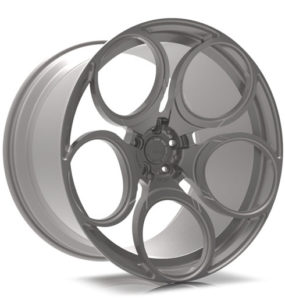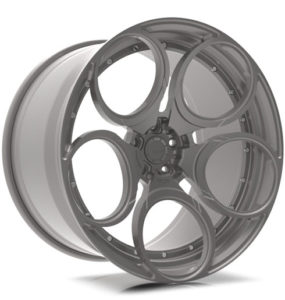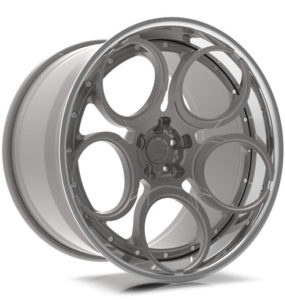”One of the most important things on a car to make really light and strong and stiff are the wheels” – Christian von Koenigsegg
Wheels… those round shape things under each and every car… Wheels are wheels, or are they?
Here we will explain details and differences in different types of wheels and the importance of different specs of them.
CAST WHEELS
Most common car wheel type today is cast aluminum wheel.
Manufacturing process involves pouring molten aluminum alloy into mold. This fast and rather cheap process gives us mass produced and very widely used wheels that are installed under most of the cars sold today. Positive sides are that alloy wheels are cheap to buy, manufacturing is fast and they are stock products. Negative sides are that this manufacturing process limits design options and cheaper products tend to have very low material and finishing quality.
High-End brands like HRE and Vossen also have some cast wheels in their product line, but they have improved regular cast wheels by using flowforming technology to enhance strength-to-weight ratio in wheel rear barrel area.
FORGED WHEELS
Forged wheels are next step from alloy wheels and they can be seen only under the very high-end production cars, racing cars or used as aftermarket tuning parts.
To simplify, manufacturing process starts with big solid block of high quality aluminum and using different milling and CNC operations forged wheel is cut into shape. This time and energy consuming process makes forged wheels significantly higher priced than alloy wheels. But on the positive side forged wheels can be made lighter and stronger than alloy wheels, their shape and design can be much more detailed and difficult, they are in most cases made to order for exact car and client to meet all the needs. If alloy wheels are like mass produced fast fashion products then forged wheels are like tailor made suits.
COMPOSITE WHEELS
Composite wheels are next step from forged wheels. Swedish hypercar manufacturer Koenigsegg was the first to put carbon fiber wheel under production car. Because of the extremely time consuming and complex production process carbon fiber wheels are very high priced and rare, found only under the most extreme cars. Composite wheel is very strong and stiff and has unmatched strength-to-weight ratio.
Composite wheels are made 1-piece, 2-piece or 3-piece construction. Multi-piece wheels are often made so that spokes are made of forged aluminum and barrels are made out of carbon fiber. This makes manufacturing process easier and wheel more affordable.
”One of the most important things on a car to make really light and strong and stiff are the wheels, thats why we make them out of carbon fiber” – Christian von Koenigsegg
PRINTED WHEELS
3D printing is getting more and more popular in manufacturing processes. HRE Performance Wheel created first 3D printed titanium wheel in collaboration with GE Additive. At this moment printed wheel is only a concept and a look into the future.
In general the point behind printing the wheels is to achieve strong and extremely complex design wheels that can be manufactured quickly.
Cast Wheels

1 piece
Cost around 250-1000€/pc
Weight example:
(19×10”) around 13kg/pc
Forged Wheels

1-, 2-, 3-piece
Cost around 1500-3000€/pc
Weight example:
(19×10”) around 9kg/pc
Composite Wheels

1-, 2-, 3-piece
Cost around 4000-10000€/pc
Weight example:
(19×10”) around 6kg/pc
3D Printed Wheels

Multi piece
Cost – Na (prototypes)
Weight example:
(19×10”) around 6kg/pc
Wheel Technical Specifications
First thing that catches our attention when looking at wheel is the design and size. But there are lots of different properties that are also important and what define the wheel.
- Diameter – wheel size in inches. E.g. 20”
- Width – wheel width in inces. E.g 10.5”
- Offset – distance from the hub mounting surface to the center line of the wheel. E.g ET35 (mm)
- Center Bore – size of the hole in center of the wheel where spigot fits. E.g 66.6mm
- Bolt Pattern – diameter (mm) of an imaginary circle formed by the centers of the wheel lugs. E.g 5×112
- Weight – mass of the wheel. E.g 10kg
But don’t worry! We can handle all of this for you and we help you find the perfect set for your car. We just have to know what car you are looking wheels for and we’ll take care of all these fitment and specification problems!
Importance of different wheel characteristics
There is lots of talk about wheel strength, stiffness and weight… but why they are important?
First of all, lets take a look at weight… Car accelerates, brakes and turns. Rotational inertia and centrifugal forces work against changing the velocity of spinning and changing the direction of spinning the wheel. Therefore the lighter the wheel is, the easier it is to speed it up, slow it down or change its direction of movement. Basically lighter wheels make your car feel sharper in turns, less power is lost to speed the wheels up and less power is needed to slow them down.
Wheels are part of unsprung mass. If the wheel hits the bump it moves up and tire wants to lose contact with ground. The heavier the wheel is the harder it is to force wheel/tire back in perfect contact with ground. Perfect tire contact with ground is critical while talking about car handling and sticking on the ground.
Strength and stiffness are essential when we are talking about uneven roads, potholes and bumps. It’s critical that wheel handles all these rough situations and doesn’t break. For example poor quality cast wheels tend to crack or shatter when you hit sharp potholes etc… forged wheels are more likely to just bend and not lose air from the tire, therefore they are safer in extreme situations.
What is multi-piece wheel?
1-piece

The entire wheel is one-piece detail. Spokes and barrel have solid connection and are not detachable.
2-piece

Wheel is made from two parts – rear barrel and spokes with front lip. Two parts are connected with bolts or by welding process
3-piece

Wheel is made from three parts – rear barrel, front lip and center (spokes). Three parts are connected with bolts.
1-piece wheels can be made little bit lighter than multi-piece wheels. Multi-piece wheels in the other hand have more fitment and design options.
